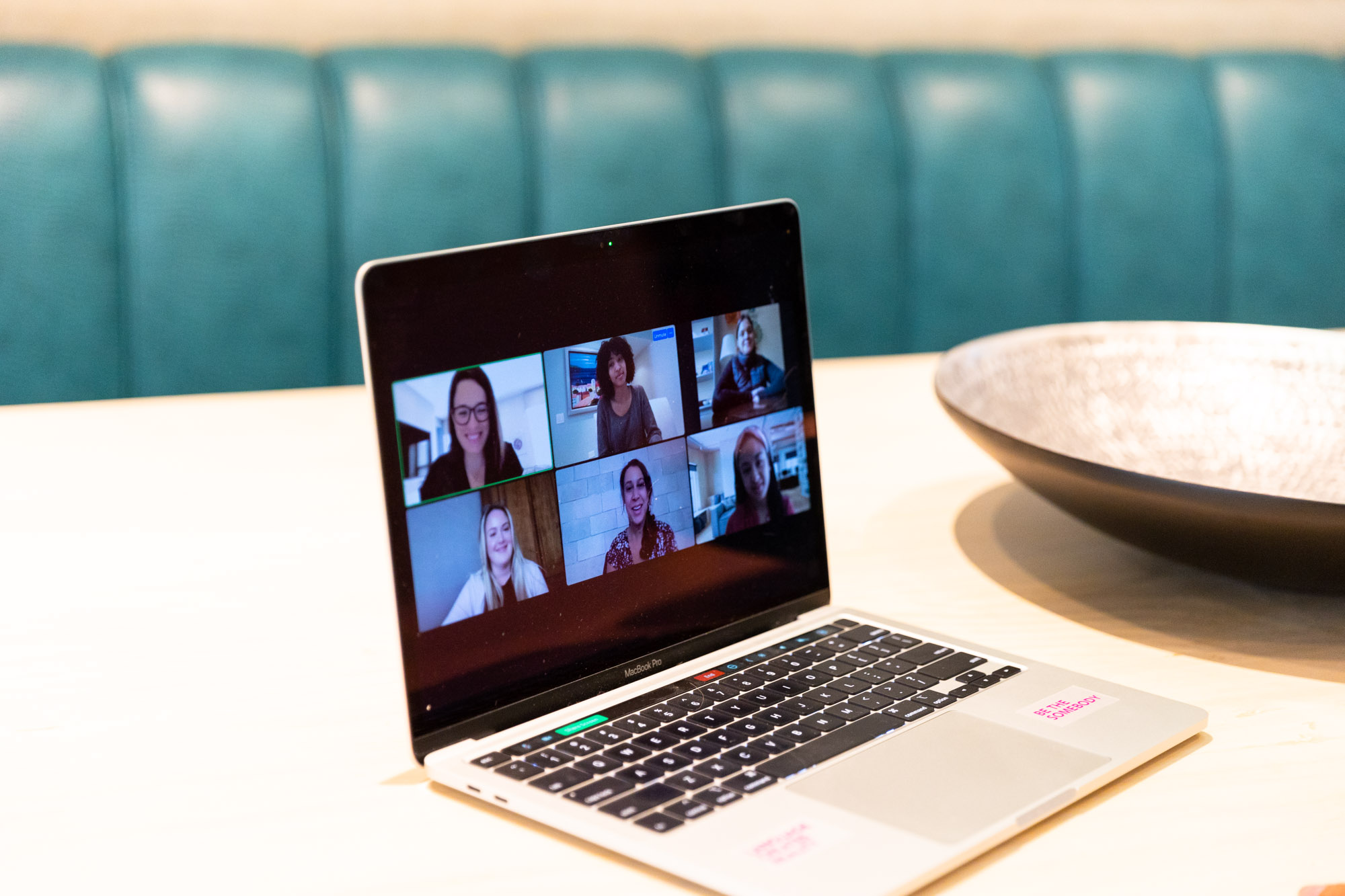
When you started, you were leading people. Now, you mostly lead empty boxes and faceless voices on a computer screen. Companies are struggling with the transition from offices to hybrid and remote work—turnover has increased, employees have become disengaged, and job satisfaction has plummeted.
You know something needs to change. But where to start?
Fast Forward Group partners with the leaders from the world’s top companies to bring meaningful human connection to the virtual and hybrid office, increasing employee engagement and retention. Through high-impact professional development programs, we give people proven Power Principles to think big and manage stress in today’s always-on environment.
Contrary to popular belief, employee engagement isn’t achieved solely through salary increases or benefit packages. Instead, research shows the secret to meaningful employee engagement is positive relationships.
Relationships play an important role in the workplace and employers can build strong engagement with their hybrid and remote employees through meaningful connections. The first step to building these connections is recognizing why remote employees are disengaging from work.
Three Challenges Facing Remote Employee Engagement
A Lack of Relationships and Connection
Virtual work has left many employees feeling isolated and disconnected from their employers. This is especially true for Gen Z and new hires who don’t have the opportunity to build relationships in the workplace. Unlike in a physical office, remote employees can go weeks or even months without speaking to their supervisor or colleagues.
In a recent New York Times article, a new graduate shared her employment experience with a remote company. On her first day, she felt distanced sitting alone in Zoom meetings. She had no opportunities to socialize with colleagues and barely spoke to her manager, who commented, “If we were in the office, I would’ve taken you out to lunch and gotten to know you.”
Unfortunately, these types of experiences were lost when the world shifted to remote employment. We adapted the work to be virtual, but we failed to adapt the connections and experiences of the workplace environment to be virtual.
When work is remote, we miss out on countless small connections. You lose the chance to chat with a coworker about their weekend, compliment someone’s shoes as they walk by your desk, or discuss your new favorite show during lunch. These seemingly trivial interactions are important to the office dynamic and bond employees.
As humans, our sense of connection directly influences our motivation. Without a strong sense of connection in our work, our motivation suffers.
Research shows the most inspiring and motivating leaders build emotional connections with their employees. This has significant implications for the success of a company. If you want to improve engagement and productivity in the workplace, emotional connections are essential. And while it’s not impossible to develop strong relationships over Zoom, it requires intention and discipline.
An All-Time Low: Employees Don’t Feel Cared For
Employees today don’t believe their employer cares about their well-being. In a 2022 survey, researchers sampled 15,001 US employees and asked if they agreed with the following statement:
“My organization cares about my overall well-being.”
The survey revealed that fewer than 1 in 4 employees strongly agreed with the statement above. This is the lowest percentage in the last 8 years.
Employees who perceive their organization doesn’t care for their well-being display less engagement, motivation, and productivity.
Employees Are Burning Out
A recent Slack survey shows that employee burnout is on the rise. Compared to other countries, the US has one of the highest burnout rates, with 43% of desk workers reporting burnout. Employees feel this exhaustion across all professions, and it is negatively impacting their performance and engagement at work.
Burnout has recently led employees to participate in behaviors termed “bare minimum Mondays” and “quiet quitting.” These employees show up to work and do the absolute minimum to get by. They go about their day putting forth minimal effort and performing only the tasks listed in their job description.
Burnout affects not only individuals but companies as a whole. Executives should be aware that burnout is:
- A major reason employees look for new jobs
- Associated with 32% worse productivity and 60% worse ability to focus
- Connected to 22x worse stress and anxiety at work
Women and workers under the age of 30 report the highest rates of burnout. This has significant implications for the engagement of your workforce.
4 Ways to Build an Engaged Team
So how do you address employee disengagement and burnout? A day off, a fitness class, or a virtual happy hour is not the answer.
Below are 4 strategies leading executives use to retain top talent and build a deeply connected workforce.

Lead with Compassion
If you want to improve the connection between you and your employees, leading from a place of positivity and kindness is crucial. Studies have shown that the most effective leaders are compassionate, humane, and treat employees as unique individuals.
You need to show employees that you respect and care for them. Employees who feel this compassion from their leaders are more engaged, loyal, and productive at work. This is why our programs focus on creating a bold vision for professional and personal success. Leading with compassion means allowing your team to bring their whole selves to work and share their personal goals and passions.
Build Trust in Your Employees
Trust is not a fast solution, but it is essential to forming solid connections. Build rapport with your employees over time to help support an authentic relationship. Be transparent in your communication and show employees that you want what’s best for them.
In an article posted by the Harvard Business Review, Scott Edinger highlights the importance of communicating your commitment to employees through the following statements:
“I have confidence in your abilities and potential.”
“I’m willing to invest the time and resources necessary to help you achieve your goals.”
Supporting employees with statements like these will help you build trust and positive relationships in the workplace.
Provide Opportunities for Employees to Connect With One Another
Research shows that having a best friend at work is crucial for engagement and job success. While these relationships can form easily in an office environment, they don’t develop naturally between remote employees. You must intentionally provide remote employees with opportunities to connect on a deeper level.
This is a foundational part of every Fast Forward workshop. Each participant is paired with a buddy who is their peer support and accountability partner. They share their bold vision for their whole life with this buddy. We also recommend they share their vision with their managers.
Participants leave deeply connected with their coworkers. These connections impact the culture of their teams, as well as their ability to manage stress and thrive.
Help Employees Avoid Burnout
The solution to burnout isn’t doing less–it’s engagement. At Fast Forward, we believe in the following quote:
“Most of the time we feel burnt out and tired not because we’ve done too much, but because we’ve done too little of what makes us come alive.” -Jim Kwik
Burnout is often misunderstood. Employees don’t burn out because they do too much—they burn out because they don’t do enough of what energizes them.
In a 2021 study, researchers found that when busy people add activities that they want to do to their schedules, they perceive time as more abundant. In the same study, participants reported that adding these meaningful activities to their schedule improved their engagement in all aspects of life–including work.
Encourage your employees to do what lights them up — in the office and beyond. When employees participate in activities that reignite their engagement in life, you will see the difference in their work. This can include:
- Mentoring new employees
- Teaching students
- Volunteering for a meaningful cause
- Joining a sports team
- Singing in a choir
- Reading a book
All the activities listed above are active rather than passive. Researchers find that active endeavors give individuals more energy and satisfaction than watching TV.
Improve Your Remote Employee Engagement With Fast Forward
Fast Forward Group offers highly interactive professional development workshops that support relationships, communication, and happiness in the workplace for in-office, hybrid and remote teams. Our simple, proven system helps people think big, manage stress, and see more as possible for their future.
We take a whole-life approach to development. Because when people are living their best lives, they do their best work.
Since 2013, Fast Forward has inspired 100,000 professionals at top companies around the globe to achieve their boldest ambitions. Partner with Fast Forward Group to discover what is possible when you build a culture of deeply engaged employees.

